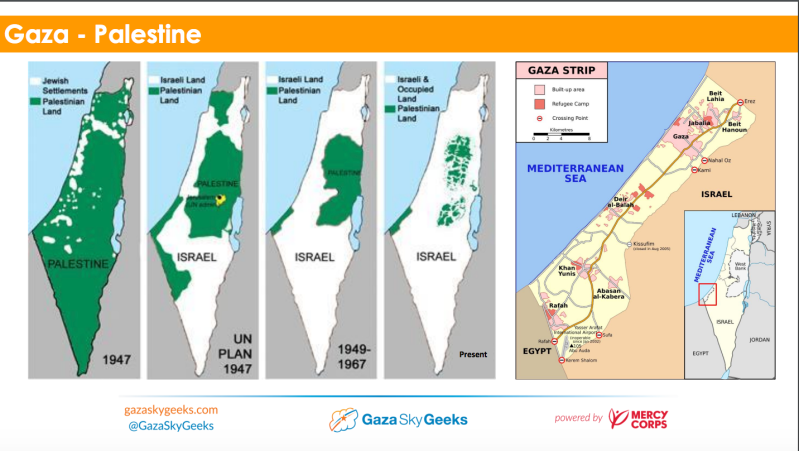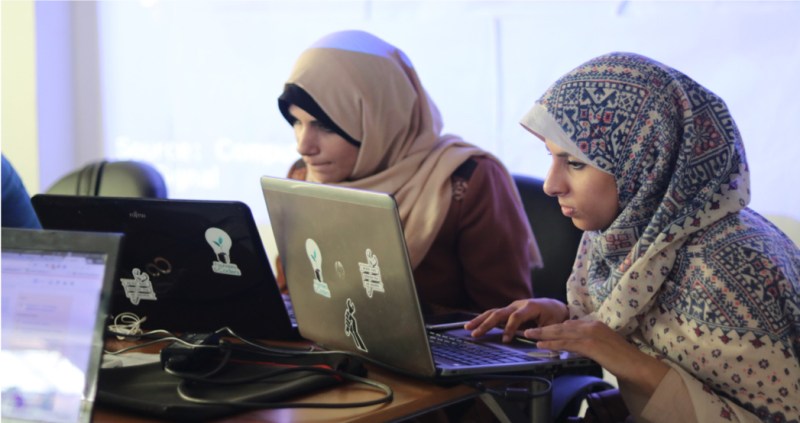Many in the tech world will point to Tel Aviv when asked which Middle Eastern city is thriving as a tech hub. The bustling Israeli metropolis has indeed developed an impressive entrepreneurial ecosystem over the past few years. But if you head south along the coast, you will find another little hub that is, in startup terms, beginning to scale: Gaza.
Despite the tense cultural, political, and religious climate of the region, the Palestinian territory has managed to hustle its way into the tech world. One embodiment of this success is Gaza Sky Geeks (GSG), a coworking space and the first accelerator program in Gaza, which is operated by humanitarian agency Mercy Corps.

Above: A map of Palestine over the years.
GSG is currently holding its fifth hackathon, which ends tomorrow. Forty-five teams (about 120 people in total) have been testing their assumptions and building the first prototype for their platforms. Prizes will range from cash to a spot in accelerator programs (one winner will participate in AngelHack’s HACKcelerator, and about 30 teams will join GSG’s 16-week GeeXelerator).
Graduates from the GeeXelerator include Momy Helper, a wellness and parenting app for Arab mothers; Izaari, an online bazaar that provides modern Arab designers with a platform to sell, print, and ship their work; and Tashbeak, an online platform in Arabic that provides small businesses with advisory solutions through freelance consultants.
June 5th: The AI Audit in NYC
Join us next week in NYC to engage with top executive leaders, delving into strategies for auditing AI models to ensure fairness, optimal performance, and ethical compliance across diverse organizations. Secure your attendance for this exclusive invite-only event.
Google in Gaza
Founded in 2011, GSG is part of the Google for Entrepreneurs network and received seed funding from Google.org. Other funding partners include 500 Startups, the Skoll Foundation, and the Bank of Palestine. Tech heavyweights like Facebook, Stripe, and Amazon Web Services (AWS) are supporting the accelerator with in-kind contributions.
A little over a year ago, GSG launched a crowdfunding campaign called #PowerUpGazaGeeks to fund the first coding academy. Backers who joined and supported the effort include Salesforce CEO Marc Benioff, entrepreneurship author Eric Ries, Y Combinator partner Paul Graham, Techstars’ Brad Feld, and many others.

Above: Two women from the second cohort of the Code Academy working together on a project.
Google for Entrepreneurs helped GSG launch a women’s inclusivity program that aims to represent and serve the female community in Gaza.
“The biggest challenge that Gazan startup founders face is isolation,” a statement on the Google for Entrepreneurs website says. “Gaza’s borders are closed and most entrepreneurs at Gaza Sky Geeks have never been more than 20 km from home.”
Unique challenges, universal skills
The reality is indeed harsh for Palestinians in the region. The population of approximately 1.9 million people (including 1.3 million refugees) suffers an unemployment rate of just under 45 percent, 68 percent of which are college graduates. According to GSG, there are only about four to eight hours of electricity per day, the water is undrinkable, and entering or exiting the region is extremely challenging, if not impossible at times.
Hani Mortaja, who handles data and operations at GSG, has experienced these challenges firsthand. The young entrepreneur wanted to travel to Amsterdam for an exchange program with TQ, which is also part of the Google for Entrepreneurs network. He waited seven months to get permission to travel and spent two days waiting at the Rafah border, followed by a 12-hour bus ride through Egypt. Here in Silicon Valley, we get frustrated if we have to wait more than five minutes for our Lyft ride.
Sarah Drinkwater, who heads Google for Entrepreneurs’ Campus London, can relate to this dichotomy.
“When I visited Gaza in the summer of 2016, Brexit had just happened,” she said, in an interview with VentureBeat. “I felt like it would be harder for the startup community in London with this new system. But when I got to Gaza, I thought: If they can build such amazing companies amid this tense political climate, we in the UK can thrive.”
So yes, perspective matters.
And we can all benefit from the tech talents of these Gazan coders and entrepreneurs as GSG helps them outsource their talents.
“We seek to create work opportunities for graduates of coding and freelancing training, either through contracted work with clients abroad or on platforms like Upwork.com,” wrote GSG director Ryan Sturgill, in an email to VentureBeat.
Because at the end of the day, coding is a universal language that isn’t bound by cultural, religious, or political differences.

